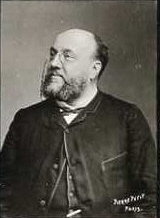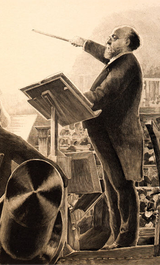
Charles Lamoureux
Encyclopedia


Conducting
Conducting is the art of directing a musical performance by way of visible gestures. The primary duties of the conductor are to unify performers, set the tempo, execute clear preparations and beats, and to listen critically and shape the sound of the ensemble...
and violin
Violin
The violin is a string instrument, usually with four strings tuned in perfect fifths. It is the smallest, highest-pitched member of the violin family of string instruments, which includes the viola and cello....
ist.
He was born in Bordeaux
Bordeaux
Bordeaux is a port city on the Garonne River in the Gironde department in southwestern France.The Bordeaux-Arcachon-Libourne metropolitan area, has a population of 1,010,000 and constitutes the sixth-largest urban area in France. It is the capital of the Aquitaine region, as well as the prefecture...
, where his father owned a café. He studied the violin with Narcisse Girard
Narcisse Girard
Narcisse Girard was a French conductor and composer.Girard was born in Nantes. A pupil of Pierre Baillot , and Anton Reicha at the Conservatoire, after completing his studies there he went to Italy for a year to further his training...
at the Paris Conservatoire, taking a premier prix in 1854. He was subsequently engaged as a violinist at the Opéra
Opera
Opera is an art form in which singers and musicians perform a dramatic work combining text and musical score, usually in a theatrical setting. Opera incorporates many of the elements of spoken theatre, such as acting, scenery, and costumes and sometimes includes dance...
and later joined the Société des Concerts du Conservatoire. In 1860 he was a co-founder of the Séances Populaires de Musique de Chambre and in 1872 he founded a quartet which eventually took on the proportions of a chamber orchestra.
Having journeyed to England and assisted at a Handel
George Frideric Handel
George Frideric Handel was a German-British Baroque composer, famous for his operas, oratorios, anthems and organ concertos. Handel was born in 1685, in a family indifferent to music...
festival, he thought he would attempt something similar in Paris. Having come into a fortune through marriage, he put on the performances himself, leading to the foundation of the Société Française de l'Harmonie Sacrée. In 1873 Lamoureux conducted the first performance in Paris of Handel's Messiah
Messiah (Handel)
Messiah is an English-language oratorio composed in 1741 by George Frideric Handel, with a scriptural text compiled by Charles Jennens from the King James Bible and the Book of Common Prayer. It was first performed in Dublin on 13 April 1742, and received its London premiere nearly a year later...
. He also gave performances of Bach
Johann Sebastian Bach
Johann Sebastian Bach was a German composer, organist, harpsichordist, violist, and violinist whose sacred and secular works for choir, orchestra, and solo instruments drew together the strands of the Baroque period and brought it to its ultimate maturity...
's St Matthew Passion, Handel's Judas Maccabaeus, Gounod
Charles Gounod
Charles-François Gounod was a French composer, known for his Ave Maria as well as his operas Faust and Roméo et Juliette.-Biography:...
's Gallia, and Massenet
Jules Massenet
Jules Émile Frédéric Massenet was a French composer best known for his operas. His compositions were very popular in the late 19th and early 20th centuries, and he ranks as one of the greatest melodists of his era. Soon after his death, Massenet's style went out of fashion, and many of his operas...
's Eve. As funds ran out, Lamoureux took up posts at the Opéra-Comique
Opéra-Comique
The Opéra-Comique is a Parisian opera company, which was founded around 1714 by some of the popular theatres of the Parisian fairs. In 1762 the company was merged with, and for a time took the name of its chief rival the Comédie-Italienne at the Hôtel de Bourgogne, and was also called the...
(1876) and the Opéra
Opera
Opera is an art form in which singers and musicians perform a dramatic work combining text and musical score, usually in a theatrical setting. Opera incorporates many of the elements of spoken theatre, such as acting, scenery, and costumes and sometimes includes dance...
(1877-79) which were short-lived, due to Lamoureux's tendency to quarrel over their productions.
Lamoureux then drew up a contract with the Théâtre du Château d’Eau to give weekly symphony concerts. The Société des Nouveaux-Concerts (which became known as the Concerts Lamoureux) was directed by Lamoureux from 1881 until 1897, when he was succeeded by Camille Chevillard
Camille Chevillard
Camille Chevillard was a French composer and conductor.He was born in Paris, France. He led the Lamoureux Orchestra in the premieres of Debussy's Nocturnes and La mer . He was the son-in-law of conductor Charles Lamoureux...
, his son-in-law. These concerts contributed greatly to popularizing Wagner
Richard Wagner
Wilhelm Richard Wagner was a German composer, conductor, theatre director, philosopher, music theorist, poet, essayist and writer primarily known for his operas...
's music in Paris.
In fact Lamoureux's advocacy of Wagner's music was untiring. When he gave the first French performance of Wagner's Lohengrin at the Eden-Théâtre in 1887, the Chauvinists
Chauvinism
Chauvinism, in its original and primary meaning, is an exaggerated, bellicose patriotism and a belief in national superiority and glory. It is an eponym of a possibly fictional French soldier Nicolas Chauvin who was credited with many superhuman feats in the Napoleonic wars.By extension it has come...
held street demonstrations outside denouncing the performance as an unpatriotic act. Despite this setback, two years later the work was restaged at the Opéra, which now made Lamoureux its musical director.
In 1893 Lamoureux made a tour of Russia. He visited London on several occasions, and gave successful concerts with his orchestra at the Queen's Hall
Queen's Hall
The Queen's Hall was a concert hall in Langham Place, London, opened in 1893. Designed by the architect T.E. Knightley, it had room for an audience of about 2,500 people. It became London's principal concert venue. From 1895 until 1941, it was the home of the promenade concerts founded by Robert...
, on one occasion sharing the stage with Sir Henry Wood
Henry Wood (conductor)
Sir Henry Joseph Wood, CH was an English conductor best known for his association with London's annual series of promenade concerts, known as the Proms. He conducted them for nearly half a century, introducing hundreds of new works to British audiences...
and Wood's own orchestra. Lamoureux died at Paris in December 1899; Tristan und Isolde
Tristan und Isolde
Tristan und Isolde is an opera, or music drama, in three acts by Richard Wagner to a German libretto by the composer, based largely on the romance by Gottfried von Straßburg. It was composed between 1857 and 1859 and premiered in Munich on 10 June 1865 with Hans von Bülow conducting...
had been at last heard in Paris, owing to his initiative and under his direction. After conducting one of the performances of this masterpiece he was taken ill and succumbed in a few days, having had the consolation before his death of witnessing the triumph of the cause he had so courageously championed.

